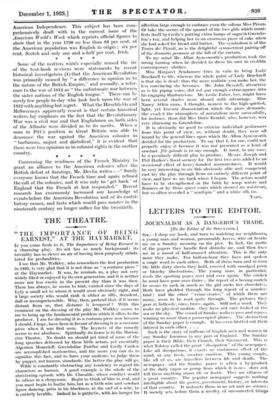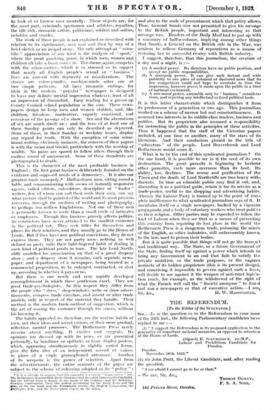LETTERS TO THE EDITOR.
JOURNALISM AS A DANGEROUS TRADE. [To the Editor of the SPECTATOR.]
drop my book, and turn to watching my neighbours, a young man and woman, presumably lovers, who sit beside me on a Sunday morning on the pier. In fact, the rustle of the papers they handle first disturbs me. and then fixes me in a mood of half-amused attention. This is the only noise they make. For half-an-hour they have not spoken a single word to each other. Both of them turn and re-turn the little dirty sheets they hold, covered with smudged print or blotchy illustrations. The young man, in particular, reads the sporting pages over and over again. The cricket he must have gone over thrice ; the report of a boxing-match he seems to suck in much as the girl sucks her chocolates. Both have plodded through the long report of a murder- trial ; and the other " crime-stories," of which there are many, seem to be read quite through. The pictures they gaze at listlessly, once, twice, again. Still not a word. They make no physical motion—they have not once looked at the sea or the sky. The crowd of Sunday walkers pass and repass, winning no more than a preoccupied glance. The distraction of the Sunday paper is enough. It has even blotted out their interest in each other. . . .
Such is the story of millions of English men and women in any Sunday forenoon in any part of England. The Sunday paper is their Bible, their Church, their Sacrament. This is what Tolstoy called the great "dissipation" of the newspaper. Like all dissipations, it exacts no continuous effort of the mind, or any fresh, creative emotion. This young couple, like all of us, are travellers between life and death. The newspaper—and the Sunday paper is often a by-product of the daily organ or group from which it issues--does not tell them anything alma life or death. They are citizens of a great country. The popular newspaper suggests nothing intelligible about the power, government, history, or interests of that country. It instructs them in no art and no science. It merely sets before them a medley of unconnected things to look at or browse over mentally. These objects are, for the most part, criminals, sportsmen and athletes, royalties, the idle rich, dramatic artists, politicians, soldiers and sailors, notables and cranks.
The work of these people is nut explained or described with relation to its significance, save now and then by way of a brief sketch or an insipid story. The only attempt at " scien- tific " appreciation of any kind is the analysis of " sport," where the great gambling game, in which men, women and children all take a hand, comes in. Th is theme, a ga in, competes with the crime-motive, which is so stressed as to suggest
that nearly all English people's sexual or business " lives arc crossed with depravity or misadventure. The stories arc crime-puzzles, machine-made after one or two simple patterns. All have romantic endings, for little in the modern " popular " newspaper is designed to leave any definite mental impression whatever, least of all an impression of discomfort. Easy reading for a grown-up County Council school population is the aim. These news- papers design to keep men and women childish, and, like children, friVolous, inattentive, vaguely emotional, and conscious of the passage of a show. Sex and the aberrations of sex are much dwelt on ; and the tone of at least one of these Sunday prints can only be described as depraved. None of them, in their Sunday or weekday issues, display any regard for truth. With the exception of some sensa- tional writing, obviously insincere, the concern of these papers is with the mean and trivial, particularly with the worship of wealth. No pains are spared to follow idlers through their endless round of amusement. Some of these decadents are photographed to death.
This is the character of the most profitable business in England ; the first great business deliberately founded on the existence and supposed needs of a democracy. It is also our greatest trade monopoly.* Half-a-dozen men, sitting round a table, and communicating with scores of instantly responsive agents, called editors, sub-editors, descriptive or " leader " writers, few of whom can call their souls their own, can say what picture shall be painted of the world and its most precious concerns, through the medium of writing and photography, to perhaps ten million Englishmen. Not one of these men is personally known to more than a small circle of intimates or employees. Though this business gravely affects politics, its conductors have never attained to the smallest eminence in the political art. They seek titles for themselves and places for their relatives, and they usually go to the House of Lords. But if they have any political convictions, they do not express them. They are not party men—nothing so well defined as party suits their light-fingered habit of dealing in each kind of political goods in turn. The late Lord North- cliffe modelled his organization on that of a great drapery store ; and a drapery store it remains, each separate news- paper, and department of a newspaper, being treated as a commercial proposition, to be enlarged, contracted, or shut up, according to whether it pays or no.
But there is one newly and very rapidly developed accomplishment in which these gentlemen excel. They are good trade-psychologists. In this respect they differ from the people who " dress " shop-windoWs, write or draw adver- tisements, compose trade circulars, and invent or alter trade models, only in respect of the material they handle. Their method is the modern trade-method of suggestion, which is the art of wooing the customer through his senses, without his knowing it.
The habits appealed to, therefore, arc the routine habits of men, not their ideas and moral visions, or their more gradual, reflective, mental processes. The Rothermerc Press rarely reasons about anything. It excites and suggests. Its opinions are dressed up with its news, or are presented pictorially, by headlines or epithets, or huge display posters, which, appearing simultaneously in slightly varied forms, give the false idea of an independent accord of voices, in place of a single gramophoned utterance. Another of its weapons is the power of selection. Apart from the advertisements, the entire contents of the paper are subject to the scheme of colouring adopted as its " policy " ;
• it is a mistake to suppose that this monopoly is a purely " CouservarNe " one. The Rothermere-Beaverbrook-Berry Combines may be ca.kd Consereattve-Capltalbd. But the Liberal Press is largely In the hands et the Cadburys and the Rowntree- eowdray combination, these two powers accounting for the Daily, Nrws and the Brae, on the one hand, and the IlSatasiaster Gtreette, the Sheffield htdeloentlehl, the Partin2ten Echo, and the Birmirgliant (laellt on the other,
and also to the scale of presentment which that policy allows. Thus, General Smuts was not permitted to give his message to the British people, important and interesting as that message was. Readers of the Daily Mail had to put up with a summary of half-a-column, implying among other things that Smuts, a General on the British side in the War, was anxious to relieve Germany of reparations as -a means of restoring her to successful rivalry with British industry.
I suggest, therefore, that this journalism, the creature of a day and a night, is
(a) A masked power. Its directors have no public position, and' accept no public responsibilities. (b) A monopoly power. It can give such instant and wide publicity to one piece of coloured or doctored news that its. few competitors could not hope to overtake in time the impression, however grave, it made upon the public in a time of national excitement.
(e) A non-moral power, amenable only to " business " considera- tions, and rejecting any intellectual or fixed political basis.
It is this latter characteristic which distinguishes it from its predecessor of a generation or two ago. This journalism worked on a scheme of narrow but real conscientiousness. It assumed two interests in its middle-class readers, business and politics. But its proprietors also assumed a responsibility for instructing the public in the principles of these activities. Thus it happened that the staff of the Victorian papers included, at one time or another, many of the stars of its literature. And their conductors gloried in the title of educators " of the people. Lord Beaverbrook and Lord Rothermere would scorn it.
What is to be the end of this syndicated journalism ? On the one hand, it is possible to see in it the seed of its own destruction. The great parasite is beginning to harbour. other parasites, each more ravenous than its host. Its ability, too, declines. The rescue and purification of the Times and the death of Lord Northcliffe are two heavy with- drawals. In time an educable public may find it out, and, discarding it as a political guide, retain it for its service as a trade-poster, useful to the shopping and advertising habits. Already the Labour Party is trained up to the point of com- plete indifference to what syndicated journalism says of it. It maintains itself on a single newspaper, backed by a vigorous propaganda, and a body of voluntary workers who treat politics as their religion. 'Other parties may be expected to follow the lead of Labour when they see that as a means of preventing this country from regaining its lost place in the world the Rothermere Press is a dangerous trade, poisoning the minds of the English, as other industries, still unfavourably known. to the law, used to poison their bodies.
But it is quite possible that things will not go the tra.ncu'l and traditional way. The State, or a firture Government of the State, finding itself upagainst a power which intends to bring any Government to an end that fails to satisfy the private ambition, or the trade purposes, or the vagrant instincts of its hidden proprietors (this is its present design), and conceiving it impossible to govern against such a force, will decide to use against it the weapon of anti-trust legis!a- tion (such, for example, as the withdrawal of the right of what the French well call the " Societe anonyme " to fourd and run a newspaper) or that of executive action.—I am5



























































 Previous page
Previous page